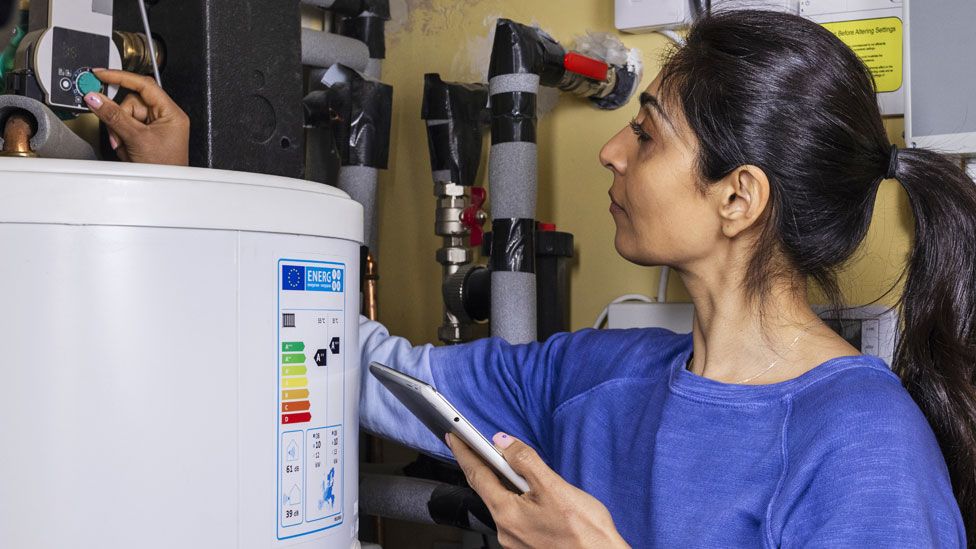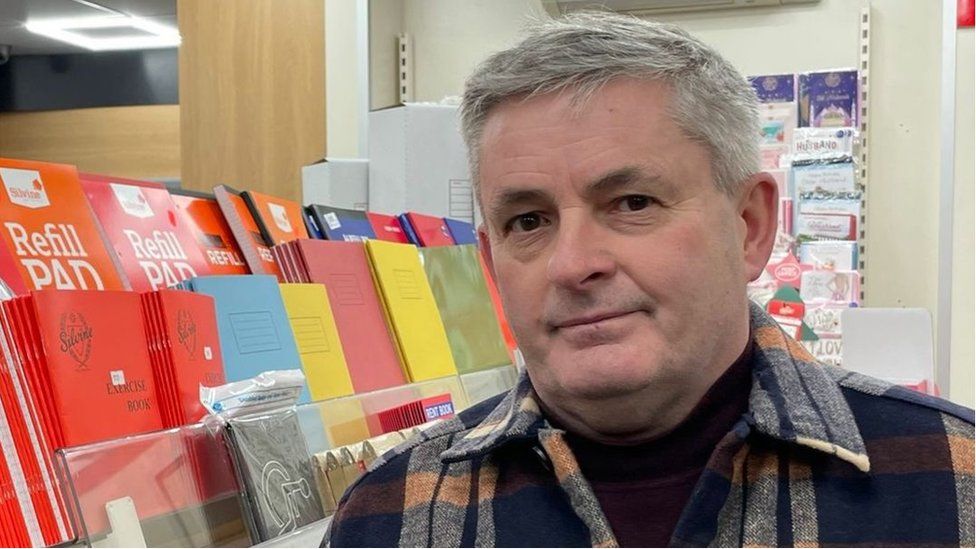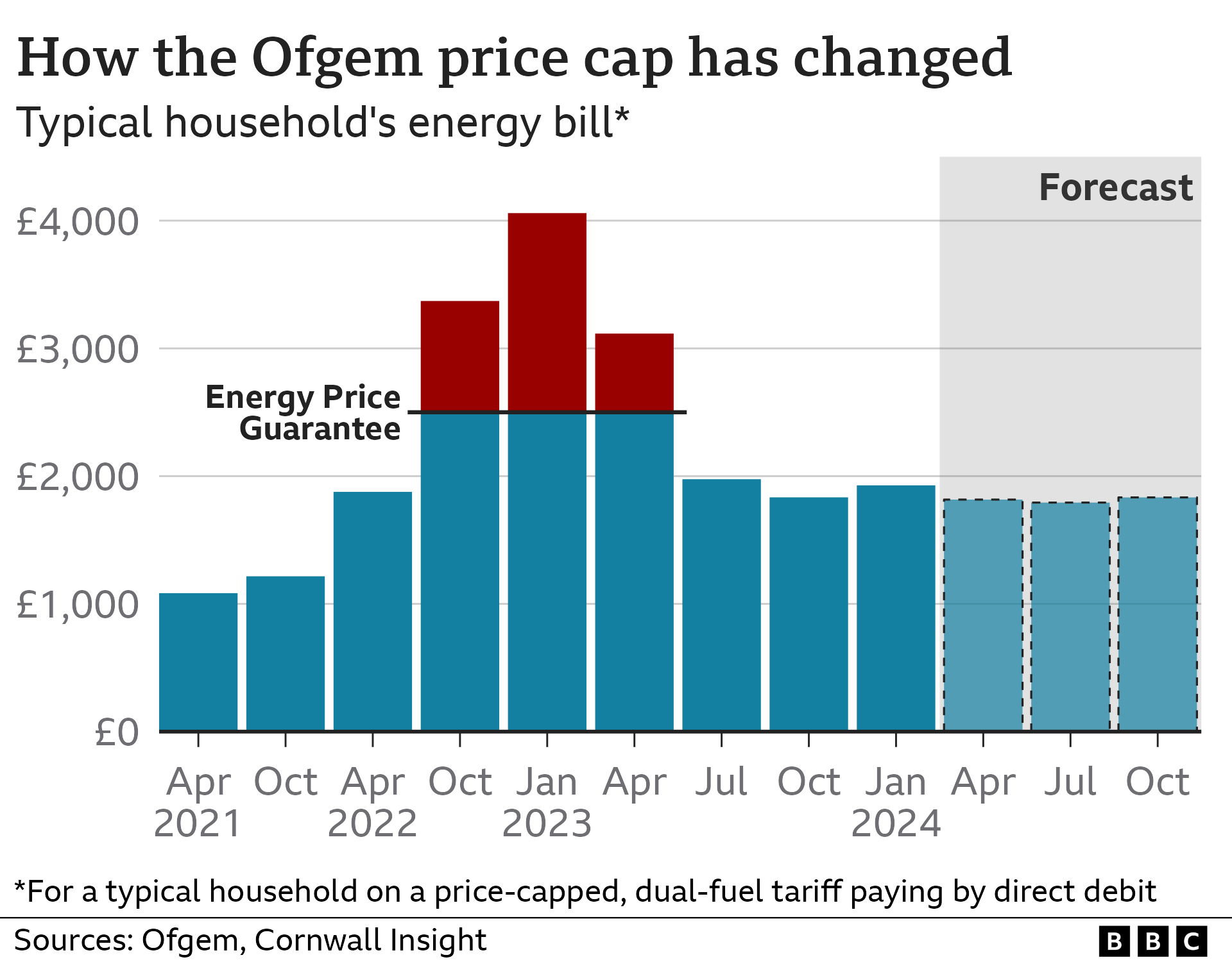A new domestic energy price cap has been announced leading to higher bills for millions.
 Image source, Getty Images
Image source, Getty ImagesHousehold energy prices will rise in January putting more financial pressure on billpayers at the coldest time of year.
Energy regulator Ofgem said the typical annual household bill would go up from £1,834 to £1,928, a rise of £94 or 5%.
It said the rise in bills would be “worrying” at a difficult time for many people, but was the result of higher wholesale costs faced by suppliers.
Analysts have predicted that prices will fall back in March.
The announcement comes the day after Chancellor Jeremy Hunt delivered his Autumn Statement.
The regulator’s price cap affects 29 million households in England, Wales and Scotland. Rules are different in Northern Ireland. Ofgem sets the maximum amount that suppliers can charge for each unit of gas and electricity but not the total bill, so if you use more, you will pay more.
Specifically, the price of gas will be 7p per kilowatt hour (kWh), and electricity will 29p per kWh.
“It is important that customers are supported and we have made clear to suppliers that we expect them to identify and offer help to those who are struggling with bills,” said Jonathan Brearley, chief executive of Ofgem.
Dr Craig Lowrey, principal consultant at energy analysts Cornwall Insight, said: “Amid the cost-of-living crisis, the last thing households need is a rise in energy bills – especially going into the winter months.
“However, as is often the case in the energy market, new challenges have arisen, and our reliance on foreign energy has once again left the UK vulnerable to price increases caused by events around the globe.”
For customers such as Roy Bridgewood, a rise in prices will add extra pressure on to the financial difficulties he is already struggling to cope with.

Mr Bridgewood, from Manchester, is about £1,400 in debt on his gas and electricity bills.
“The last payment I made on the gas was about £800. It was every penny I had left in my savings,” he said.
He has been out of work for a year and has two teenage children at home.
“I’m struggling to get work, struggling to pay bills and struggling to live. You feel vulnerable,” he said.
Experts say he is sensibly trying to pay what he can, and is being open with his supplier.
The vast majority of people pay by direct debit, with payments smoothed out over the year.
Households on prepayment meters will be most affected by higher prices during the winter, as customers tend to pay to top up just before they use the gas and electricity. Their typical annual bill will rise to £1,960 in January.
Those who pay every three months by cash and cheque pay more than those who use other methods of payment. Their typical annual bill in January will be £2,058, some £130 more a year than if they paid by direct debit.

Part of Ofgem’s announcement includes a cap on standing charges – a fixed daily charge covering the costs of connecting to a supply.
There has been anger about increasing fees and customers’ inability to reduce what they pay. Ofgem recently launched a review of these charges and asked for views from the public.
Charges vary depending on where customers live, but the amount of energy that they use is irrelevant for this part of a household bill.
In most areas, the charge has doubled over the last two years. In January, a typical household will pay 53p a day for electricity and 30p a day for gas.
Last winter, overall energy prices were high and rises would have been bigger had it not been for the government’s Energy Price Guarantee limiting the typical bill to £2,500. Each household also received £400 of support over six months, but this year the government has not announced any equivalent scheme.
That withdrawal of support and a rise in prices mean bills during this winter could be higher than they were last winter for millions of households.
The Chancellor, Jeremy Hunt, told the BBC that he understood that “lots of households are struggling”, and pointed to rises in pensions and benefits announced in the Autumn Statement that would help pay energy bills.
However, he would not be drawn on whether further direct support would be provided.
Gillian Cooper, director of energy at Citizens Advice, said: “Yesterday, the government missed the opportunity to announce extra support for households who desperately need it this winter.”
A typical household energy bill fell by £240 a year in October to £1,834 a year but, of that, £89 was not an actual drop in the price you pay, but actually the result of a new estimate of the typical amount of gas and electricity used by households. Had the calculation not been amended, the fall would have been £151 a year.
Typical annual household consumption is now estimated to be 2,700 kWh a year for electricity, and 11,500 kWh a year for gas.
Your device may not support this visualisation

What can I do if I can’t afford my energy bill?
- Check your direct debit: Your monthly payment is based on your estimated energy use for the year. Your supplier can reduce your bill if your actual use is less than the estimation.
- Pay what you can: If you can’t meet your direct debit or quarterly payments, ask your supplier for an “able to pay plan” based on what you can afford.
- Claim what you are entitled to: Check you are claiming all the benefits you can. The independent MoneyHelper website has a useful guide.


Sign up for our morning newsletter and get BBC News in your inbox.


How will the energy price cap rise affect you? Share your experiences by emailing haveyoursay@bbc.co.uk.
Please include a contact number if you are willing to speak to a BBC journalist. You can also get in touch in the following ways:
- WhatsApp: +44 7756 165803
- Tweet: @BBC_HaveYourSay
- Upload pictures or video
- Please read our terms & conditions and privacy policy
If you are reading this page and can’t see the form you will need to visit the mobile version of the BBC website to submit your question or comment or you can email us at HaveYourSay@bbc.co.uk. Please include your name, age and location with any submission.